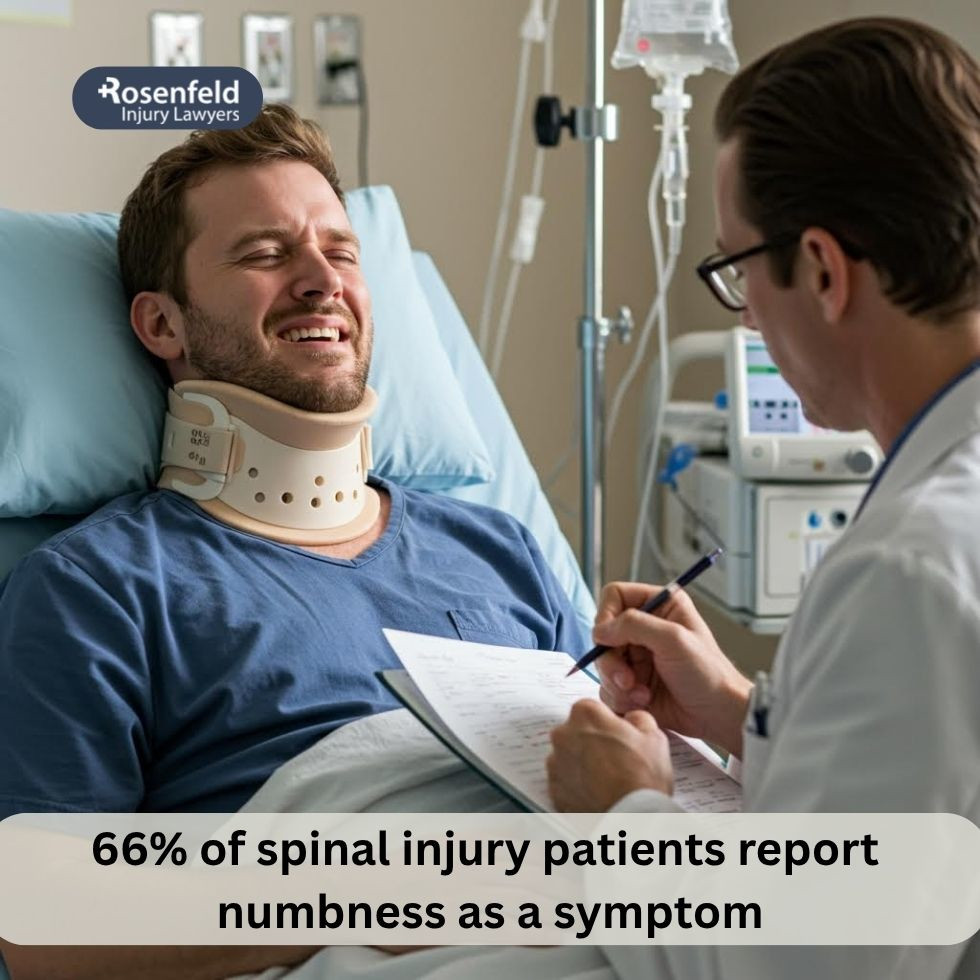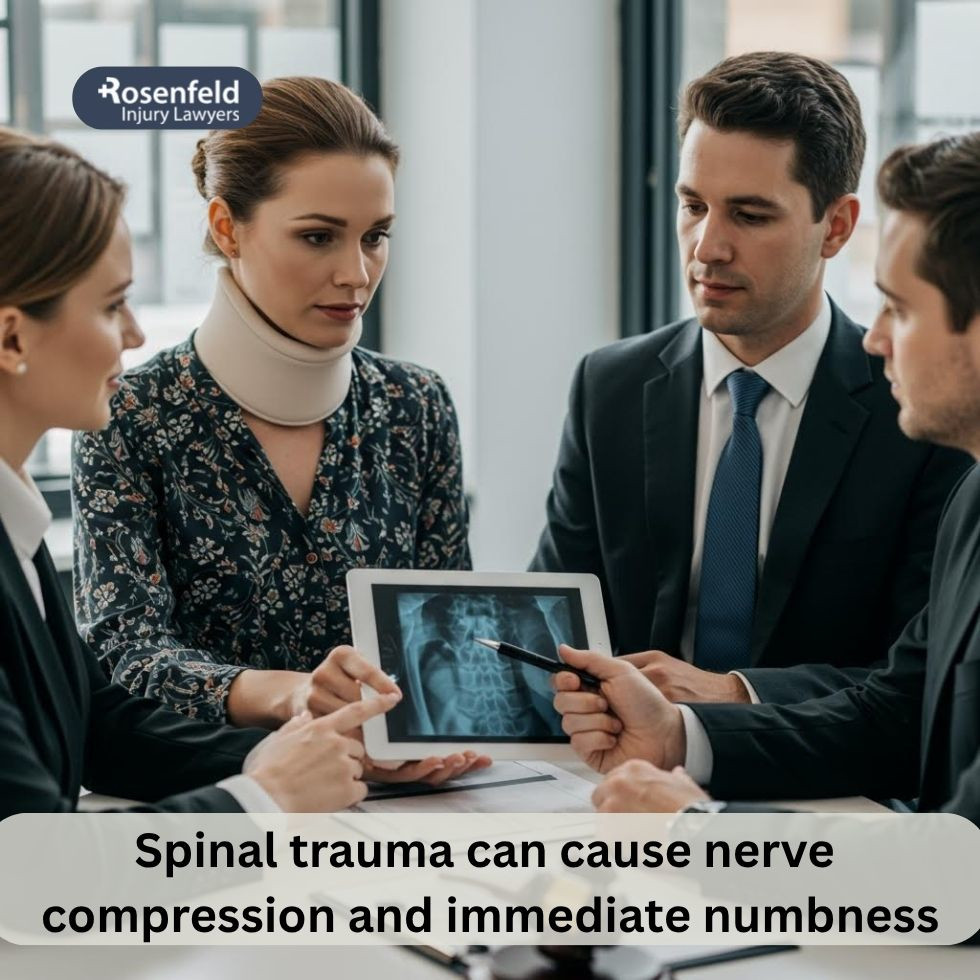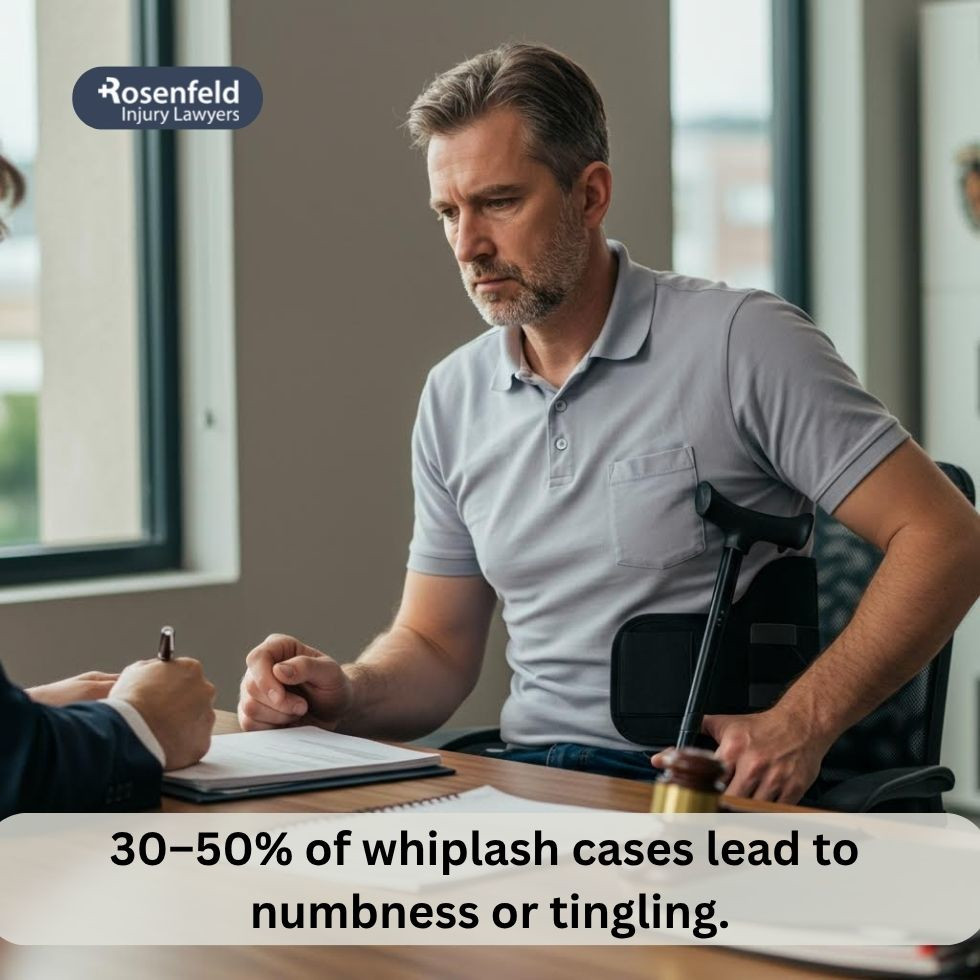- 24/7 Free Consultation: (888) 424-5757 Tap Here To Call Us
What Does Numbness or Tingling Mean After a Car Accident?
Experiencing numbness or tingling after a car crash may be an early sign of nerve damage. If you’re wondering: “What does numbness or tingling mean after a car accident?”, in many cases, it indicates that nerves have been compressed, stretched, or even severed during the impact.
The body may respond with sensations like pins and needles, burning, or a complete loss of feeling. These symptoms may surface right away or appear days later, especially as inflammation develops or underlying injuries worsen.
Injuries such as herniated discs, spinal cord trauma, or fractured bones pressing on nerve tissue can all cause tingling after a car accident. In more severe cases, severed nerves may require surgical repair and lead to long-term impairment.
Failing to seek immediate medical attention can result in complications or a delayed diagnosis. Recognizing these warning signs and speaking to a medical professional quickly can make a meaningful difference in your recovery and help support any future injury claim.

How Nerve Damage Develops After a Car Accident
Nerve damage is a serious concern for many car accident victims, especially in cases involving spinal cord trauma or violent impacts. Compressed, stretched, or torn nerves can lead to lasting pain, mobility challenges, and reduced function.
Recognizing how these injuries develop and how they affect the body can help you spot early symptoms and seek medical attention before complications set in.
Types of Nerve Damage
Depending on the force and direction of the collision, a car accident can damage peripheral, motor, or spinal nerves. Victims may suffer peripheral neuropathy, where the peripheral nervous system is damaged, affecting movement and sensation in the limbs.
Other types include injuries to the sciatic, radial, or median nerve, which can cause numbness or tingling in the arms, hands, or legs. In severe cases, torn nerves can result in permanent nerve damage.
Mobility Impairment
When nerves are compressed, typically due to swelling, herniated discs, or spinal cord compression, they may send abnormal signals to the brain, resulting in nerve pain, burning sensations, or numbness and tingling.
Stretched or severed nerves, which can occur during whiplash or sudden impact, may lead to muscle weakness, reduced reflexes, or even paralysis in the affected limbs. The location of the damage, such as in the cervical spine, also plays a role in what parts of the body are affected.
Common Causes of Nerve Damage in a Car Accident
Nerve injuries often stem from blunt force trauma, which compresses or pinches nearby nerves. Accidents that involve sudden deceleration, twisting motions, or brain and spinal cord injuries are especially likely to result in nerve damage.
Whiplash is a frequent contributor, as it causes the neck to snap violently back and forth, potentially injuring nerves along the spine. These auto accident injuries can be difficult to detect at first, which is why prompt medical attention is critical for anyone experiencing numbness and tingling after a car accident.
Herniated Discs
A herniated disc occurs when the soft center of a spinal disc pushes through a crack in the tougher exterior casing. This displacement usually puts too much pressure on nearby nerves, leading to sharp pain, burning, or tingling after a car accident.
If left untreated, it may cause severe nerve damage or result in a condition resembling peripheral neuropathy. Patients experiencing these symptoms should seek prompt medical care to prevent long-term complications.
Compressed Nerves
Spinal misalignment, inflammation, or fractures caused by a car accident can lead to compressed nerves, which interfere with the body’s normal signaling. As pressure builds, pain may radiate outward, often accompanied by numbness, tingling, or muscle weakness.
In some cases, testing like nerve conduction velocity studies may be needed to assess the severity of nerve blockage and determine how signals are being disrupted across the peripheral nerves.
Pinched Nerves
Pinched nerves, where a nerve is trapped or irritated by surrounding bones, tendons, or muscles, can develop after even minor auto accidents. Over time, this compression may lead to chronic pain, limited mobility, or worsening symptoms like tingling sensations and burning.
Untreated pinched nerves may also cause damage to motor nerves, which control movement, making everyday tasks difficult or painful.

Common Symptoms of Nerve Damage After a Car Accident
Following an auto accident, it’s common for victims to overlook subtle warning signs that point to serious neurological trauma. Nerve damage may not be immediately apparent, but over time, symptoms such as numbness and tingling or radiating discomfort can signal that the spinal cord or sensory nerves have been affected.
Recognizing these changes early is essential for receiving the right medical treatment and reducing the risk of long-term complications.
Muscle Weakness and Loss of Control
When nerve pressure affects the nerves, you may notice decreased grip strength, trouble lifting your foot, or difficulty maintaining balance. This weakness can result from spinal cord compression or damage to the sciatic nerve, often following forceful impacts during a car accident.
Radiating Pain, Numbness, and Tingling
Nerve pain that spreads through the arms, legs, or torso is often a sign of a pinched or inflamed nerve. Victims frequently describe numbness, tingling, or even burning sensations in areas tied to injured nerve pathways.
Damage to the cervical spine can cause neck pain, while irritation of the sciatic nerve may result in sciatica pain radiating through the lower back and legs. These symptoms often appear before more severe dysfunction sets in.
Sensitivity to Temperature and Lasting Pain
Some people with nerve damage become unusually sensitive to hot or cold temperatures. This reaction can occur when autonomic nerves, which regulate involuntary body functions, are affected.
In these cases, significant pain may persist even without movement or pressure. While this type of injury may be less visible than a fracture, it can signal a serious injury that needs ongoing care.
When to Seek Medical Help
Symptoms that worsen, spread, or persist beyond a few days should never be ignored. Weakness, radiating pain, and altered sensation could point to permanent nerve damage.
Seeking medical treatment early allows your provider to assess the root cause, such as a pinched nerve, cervical spine misalignment, or deeper spinal cord involvement, and begin an effective care plan.
Seeking Medical Attention for Nerve Damage After an Auto Accident
After a car accident, symptoms like numbness and tingling, burning sensations, or muscle weakness don’t always appear right away.
These signs may emerge days or even weeks later and could indicate underlying issues such as spinal cord compression or inflammation around the nerve roots. Without proper care, these problems can affect mobility, coordination, and long-term function.
Tests like MRIs, CT scans, and EMG studies help identify if the issue involves structural misalignment, disc herniation, or trauma. Common treatment options include physical therapy to restore movement and steroid injections to relieve pressure. In more serious cases, surgical intervention may be necessary. Seeking timely medical care can significantly impact recovery.
The Importance of Early Diagnosis for Nerve Damage
Prompt evaluation can limit the risk of lasting neurological complications. When irritation or pressure affects the nervous system, especially motor control, delays in care can lead to reduced function or loss of sensation.
Early intervention allows healthcare providers to initiate treatment options that target the affected area before deterioration sets in.
The Role of Diagnostic Testing
Tools like nerve conduction studies and EMGs can reveal disruptions in how signals travel between the brain, spine, and limbs.
These tests help pinpoint the origin of the problem, such as a herniated disc, inflamed tissue, or swelling that puts pressure on surrounding nerves, and guide the provider’s next steps. Imaging, like MRIs, also supports accurate diagnoses by identifying skeletal complications or disc misalignment.
Rehabilitation Through Physical Therapy
Once testing confirms the issue, physical therapy is usually recommended. This non-invasive approach improves mobility, strengthens surrounding muscle groups, and helps retrain the body’s natural movement patterns. For many patients, it’s a cornerstone of recovery, especially when surgery isn’t necessary.
Legal Documentation and Illinois Law
Under Illinois law (735 ILCS 5/13-202), victims have two years to file a claim for injuries sustained in an accident. Medical records, including diagnostic results and therapy progress, are vital in proving the extent of harm and connecting it to the incident.
A qualified car accident lawyer can use these records to seek fair financial recovery for care, missed work, and ongoing rehabilitation. Contact our legal team for a free consultation.

Long-Term Complications from Nerve Damage
Lingering symptoms like numbness and tingling after a car accident can signal deeper issues that may worsen over time. Without proper care, mobility loss and chronic discomfort often follow. Left untreated, these symptoms can lead to long-term impairment that affects daily life.
Accident victims may need ongoing treatment, such as physical therapy and regular medical checkups, to alleviate pain. Early and consistent care plays a key role in maintaining strength, restoring movement, and reducing the risk of further decline. Prioritizing follow-up care helps support long-term recovery.
Car Accident Injury Compensation for Nerve Damage
When symptoms like numbness and tingling develop after a collision, they may signal a serious injury that affects long-term mobility and quality of life. These symptoms can lead to mounting medical expenses.
Compensation after a car accident may include:
- Medical bills (diagnostic imaging, outpatient visits, specialist care);
- Therapeutic exercises and other forms of rehabilitation;
- Lost wages from time away from work;
- Reduced future earning capacity if the injury impacts your ability to work;
- Pain management, including medications or steroid injections;
- Home modifications or mobility aids, if necessary;
- Emotional distress related to long-term discomfort or disability.
Because insurance companies often try to downplay nerve-related symptoms, clear documentation and timely care are key to pursuing the compensation you deserve.
Why You Need a Car Accident Attorney for Nerve Damage Claims

Nerve-related symptoms like numbness, tingling, and chronic pain can lead to long-term complications and rising medical bills. A Chicago car accident attorney can help you pursue the full compensation you’re entitled to, including coverage for ongoing treatment, lost wages, and pain management.
Legal representation is especially important when dealing with insurance companies, which often dispute or minimize nerve damage claims. A lawyer can gather strong medical evidence, handle negotiations, and protect your rights every step of the way.
Schedule a free consultation to learn how a trusted legal advocate can support your recovery.
Call (888) 424-5757 or fill out our online form.
All content undergoes thorough legal review by experienced attorneys, including Jonathan Rosenfeld. With 25 years of experience in personal injury law and over 100 years of combined legal expertise within our team, we ensure that every article is legally accurate, compliant, and reflects current legal standards.







